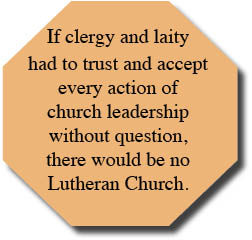Why Does the Church Accept Failure?
![]() 2×2 has studied church statistics in the last two years. A growing church is a rarity. Almost all Lutheran churches in SEPA Synod are in decline — many in double-digit decline, including some of the “most important churches” (that’s a term used in Bishop Burkat’s book about Transforming Denominational Ministries). There is no room for any church to pass judgment on another.
2×2 has studied church statistics in the last two years. A growing church is a rarity. Almost all Lutheran churches in SEPA Synod are in decline — many in double-digit decline, including some of the “most important churches” (that’s a term used in Bishop Burkat’s book about Transforming Denominational Ministries). There is no room for any church to pass judgment on another.
What is most alarming is that failure seems to be accepted. Decline continues over years. Many churches have had the same pastor during many years of decline. This may be a byproduct of the call system that requires congregations to muster a two-thirds vote to change leadership. This process tends to be divisive and avoided for good reason, long past the point when needed.
Pastors are protected by the call system. They can collect a pay check even while steeples are falling. Some even expect periodic raises as income and attendance drop! Failure has no consequence.
Why does the Church accept failure from its leadership?
It starts at the top! The ELCA presiding bishop has no trouble traveling to Washington to advise our president on the politics of the Mideast, but he has been silent about many problems facing the ELCA, as if they don’t exist.
His attitude trickles down to the bishops which trickles down to the pastors which trickles down to the congregations. You end up with a church of words without action.
A great deal of effort is spent not rocking this ecclesiastic boat. Pastors serve in isolation. Asking for help might impact their autonomy. If things get really bad (as if they aren’t already), they need friends in the denomination to help them move on.
Lay people have a different sense of commitment to their ministries. It is a truly deep “call” to them; it is the foundation of their culture, faith, and legacy. They are not likely to move when their church is failing. They will either work harder or slowly fade from involvement.
Our Ambassador visits reveal just how influential the laity is. They are holding congregations together with little help and less credit. Sadly, they will be the first to take the blame when fingers start pointing. Just ask the members of Redeemer! Our members were sued by SEPA BEFORE we were able to exercise any process called for by the constitution. The clergy working with us, who voted for and encouraged our initiatives, disappeared faster than you can say “Luther is my uncle.”
This is not to say there are no problems among the laity. Many lay people admit that they try to avoid dealing with the denomination. They fear the very treatment that Redeemer experienced. So they keep sloughing along on their own with minimal funds or professional support. Many have only part-time professional leadership, which typically covers worship and visitation but not much in the way of mission or initiative.
Without initiative their work is like that of Sisyphus.
It’s only a matter of time. They will fail unless denominations can revise their attitudes. They should not be refusing to help small churches while they wait for laity to give up, yet that is the published leadership philosophy of the current SEPA bishop! (See review) They should not be discouraging churches by providing limited options for professional leadership. Caretaker ministries — in which pastors intentionally do nothing to encourage growth but tend only the needs of current waning membership — are an insult to the mission of the Church. (Such ministries are also part of SEPA’s bishop’s published philosophy). Denominational leaders should not breeze into neighborhoods they haven’t visited in decades and dictate ministry solutions which solve their leadership placement problems and ambitions for church assets — not the congregation’s needs or mission.
These serious problems are side-stepped by the Annual Assemblies. There is little time allowed.
Our Ambassadors have noticed a troubling sentiment common among active Lutheran clergy. Many use the same words: “We’ve elected our leadership; we have to support it” or “We have to trust the wisdom of the Bishop and Synod Council.”
 They are wrong. The constitutions rely on the clergy and congregations to be the watchdogs of the church. The bishop and Synod Council serve the congregations. The constitutions work only when clergy and congregational representatives provide checks and balances over the leadership they elect. It’s their duty. To stand aside and watch poor leadership is apathetic and derelict. It does not speak well of Christianity or our denomination.
They are wrong. The constitutions rely on the clergy and congregations to be the watchdogs of the church. The bishop and Synod Council serve the congregations. The constitutions work only when clergy and congregational representatives provide checks and balances over the leadership they elect. It’s their duty. To stand aside and watch poor leadership is apathetic and derelict. It does not speak well of Christianity or our denomination.
Ignoring these duties, hoping someone else or the secular courts will do the work, is the foundation of much church failure. Leadership at every level needs to be held accountable.
